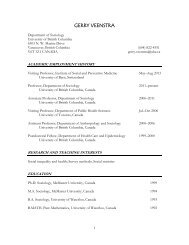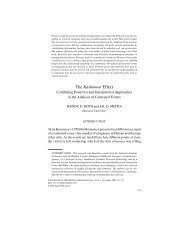SOCI 410B-001 - University of British Columbia
SOCI 410B-001 - University of British Columbia
SOCI 410B-001 - University of British Columbia
You also want an ePaper? Increase the reach of your titles
YUMPU automatically turns print PDFs into web optimized ePapers that Google loves.
THE UNIVERSITY OF BRITISH COLUMBIA<br />
Department <strong>of</strong> Sociology<br />
<strong>SOCI</strong>OLOGY <strong>410B</strong><br />
Special Studies in Canadian Society: Comparing Canada and the United States<br />
Year: 2011-2012, Term 2, January to April 2012<br />
Lecture Times: Mondays, Wednesdays, and Fridays 12 noon to 1:00 p.m.<br />
Lecture Room: ANSO 207<br />
Instructor Contact Information<br />
Instructor: Edward Grabb<br />
Office: ANSO Building, Room 1320<br />
Office Hours: Wednesdays 1p.m. to 3 p.m., or by appointment<br />
E-mail: grabb@interchange.ubc.ca<br />
Telephone: 604-822-2837<br />
Course Description<br />
This course explores theory and research on the origins and development <strong>of</strong> Canada and the<br />
United States as distinct societies. It begins by reviewing key theoretical perspectives, and then<br />
assesses important historical events that have shaped the two nations and peoples. The rest <strong>of</strong> the<br />
course compares Canada and the United States in the present day, with a central focus on<br />
dominant values and institutions, prevailing attitudes and behaviours, and major social structures.<br />
The two countries will be compared on such topics as religion and morality, criminal behaviour,<br />
ethnic tolerance and inclusion, political action, voluntary behaviour, and economic activity.<br />
Another key concern will be with internal distinctions in the two countries, especially between<br />
the French and English in Canada and between the northern and southern populations <strong>of</strong> the<br />
United States. The importance <strong>of</strong> these internal distinctions for understanding the similarities and<br />
differences between the two nations is a major theme in the course.<br />
Readings<br />
The main text is Edward Grabb and James Curtis, Regions Apart: The Four Societies <strong>of</strong><br />
Canada and the United States (Oxford <strong>University</strong> Press, 2010). It is available in the UBC book<br />
store. Access to some additional reading materials will be made available online and through<br />
class handouts. These additional readings will add, on average, about 25 pages per week to the<br />
total reading load for the class. Other information not provided in readings will be included in<br />
lectures. For this reason and others, regular classroom attendance is essential for doing well in<br />
the course.<br />
Term Tests and Final Examination<br />
There are three term tests and one final examination. Each term test is worth 20% <strong>of</strong> the course<br />
grade. Each test will be one hour in length and will be given in class time in ANSO 207. The<br />
tests are set for the following three Fridays: January 20, February 10, and March 9. The final<br />
examination, which will be two hours in length, accounts for the remaining 40% <strong>of</strong> the course<br />
grade. It will take place during the final examination period in April. The term tests and final<br />
examination will include true-false, short answer, multiple choice, and essay questions.
Edward Grabb <strong>SOCI</strong>OLOGY <strong>410B</strong> Winter, 2012<br />
Tentative Schedule<br />
Week/Date: Topic Text Readings<br />
1. January 4,6 Introduction Chapter 1<br />
2. January 9,11,13 Previous Historical and Theoretical Perspectives Chapter 2<br />
3. January 16,18 An Alternative Perspective Chapter 3<br />
***January 20 Term Test #1***<br />
4. January 23,25,27 Historical Myths and Historical Evidence Chapter 4<br />
5. January 30,February 1,3 Historical Evidence (continued) Chapter 5, begin Chapter 6<br />
6. February 6,8 Historical Evidence (completed) finish Chapter 6<br />
***February 10 Term Test #2***<br />
7. February 13,15,17 Contemporary Comparisons: Religion and Morality Chapter 7<br />
February 20 to 24 ------------------- Study Week --------------------------------<br />
8. February 27,29,March 2 Crime and the Law Chapter 8<br />
9. March 5,7 Social Inclusion and Tolerance toward Minorities Chapter 9<br />
***March 9 Term Test #3***<br />
10. March 12,14,16 Political Attitudes and Political Action Chapter 10<br />
11. March 19,21,23 Voluntary Association Involvement Chapter 11<br />
12. March 26,28,30 Looking to the Future Chapter 12<br />
13. April 2,4 Summary, Overview<br />
Note: Please be advised that the schedule is subject to minor modifications, depending on how<br />
the course progresses throughout the term. A list <strong>of</strong> additional online readings will also be<br />
provided at the beginning <strong>of</strong> the course.
Week 1 (January 4, 6): Introduction Chapter 1 —<br />
Week 2 (January 9, 11, 13): Introduction, Begin Historical Perspectives<br />
(1) Ferguson 1997 (2*), “America is Sexy” 1-9<br />
(2) Grabb and Curtis, Chapters 1 and 2<br />
Week 3 (January 16, 18, 20): Historical Perspectives (continued), Begin Historical Evidence<br />
(3) Grabb and Curtis, Chapters 3 and 4 —<br />
Week 4 (January 23, 25, 27): Historical Evidence (continued)<br />
(4) Grabb and Curtis, Chapters 5 and 6 —<br />
Week 5 (January 30, February 1, 3): Religion, Moral Issues, Family and Sexual Values<br />
(5) Lipset 1996 (2*), “Secular and Religious Sectarianism” 11-16<br />
(6) Adams 2003a (1*), on Religion and Moralism 17-19<br />
(7) Grabb and Curtis, Chapter 7, pp. 136-153 only<br />
Week 6 (February 6, 8, 10): Crime and the Law<br />
(8) Ouimet 1999 (2*), “Crime in Canada and the United States” 25-35<br />
(9) Simpson 2000b (2*), “Crime” 37-46<br />
(10) Grabb and Curtis, Chapter 7, pp. 153-165<br />
Week 7 (February 13, 15, 17): **MID-TERM TEST**<br />
------------ STUDY WEEK February 20 to February 24 -----------------<br />
Week 8 (February 27, 29, March 1): Individualism, Collectivism, and the State<br />
(11) Bothwell 1992 (1*), “More than Kin, and Less than Kind” 63-67<br />
(12) Olsen 2002 (2*), “Culture, Values, and Ideology” 55-61<br />
(13) Grabb and Curtis, Chapter 8<br />
Week 9 (March 5, 7, 9): Social Inclusion, Ethnic and Racial Tolerance<br />
(14) Simpson 2000a (2*), “Race, Ethnicity” 47-54<br />
(15) Grabb and Curtis, Chapter 9<br />
E.G. Grabb Sociology 484G Winter, 2008<br />
Detailed Schedule <strong>of</strong> Readings (continued)<br />
Course Package Pages:<br />
Week 10 (March 12, 14, 16): Political Attitudes and Political Action
(16) Adams 2003b (1*), on Politics and Government 21-24<br />
(17) Martinez 2000 (2*), “Turning Out or Tuning Out?” 69-77<br />
(18) Grabb and Curtis, Chapter 10<br />
Week 11 (March 19, 21, 23): Voluntary Involvement and Activity<br />
(19) Hwang et al. 2005 (2*), “Why Get Involved?” 79-100<br />
(20) Grabb and Curtis, Chapter 11<br />
Week 12 (March 26, 28, 30): Looking to the Future<br />
(21) Boucher 2004 (1*), “Canada-US Values” 101-106<br />
(22) Laxer 2003 (2*), “Good Fences” 107-114<br />
(23) Rifkin 2005 (2*), “Continentalism <strong>of</strong> a Different Stripe” 115-119<br />
(24) Grabb and Curtis, Chapter 12<br />
Week 13 (April 2, 4): Overview and Summary<br />
E.G. Grabb Sociology 484G Winter,<br />
2008<br />
Books on Reserve for Book Review Essay<br />
1. S.M. Lipset, American Exceptionalism: A Double-Edged Sword. E169.1.L647 1996<br />
2. Keith Banting et al., Degrees <strong>of</strong> Freedom: Canada and the United States in a Changing<br />
World. HN103.5.D43 1997<br />
3. Jeffrey Reitz and Raymond Breton, The Illusion <strong>of</strong> Difference: Realities <strong>of</strong> Ethnicity in<br />
Canada and the United States. F1035.A1R45 1994<br />
4. Richard Gwyn, Nationalism Without Walls: The Unbearable Lightness <strong>of</strong> Being Canadian.<br />
F1034.2.G98 1995<br />
5. Will Ferguson, Why I Hate Canadians. F1026.F47 1997<br />
6. Jeffrey Simpson. 2000. Star-Spangled Canadians: Canadians Living the American Dream.<br />
Toronto: Harper Collins Publishers Ltd. E184.C256 2000<br />
7. Michael Adams. 2003. Fire and Ice: The United States, Canada, and the Myth <strong>of</strong> Converging<br />
Values. Toronto: Penguin Canada. FC249.A33 2003<br />
8. James Laxer. 2003. The Border: Canada, the U.S., and Dispatches from the 49 th Parallel.<br />
Toronto: Doubleday Canada. FC76.L39 2003
9. Gregg Olsen. 2002. The Politics <strong>of</strong> the Welfare State: Canada, Sweden, and the United States.<br />
Don Mills: Oxford <strong>University</strong> Press. HB846.O48 2002<br />
10. Maude Barlow. 2005. Too Close for Comfort. Canada’s Future Within Fortress North<br />
America. Toronto: McClelland and Stewart. FC249.B368 2005<br />
11. John N. McDougall. 2006. Drifting Together. The Political Economy <strong>of</strong> Canada-US<br />
Relations. Peterborough: Broadview Press. FC249.M38 2006<br />
E. G. Grabb List <strong>of</strong> Readings for Sociology 484G Winter, 2008<br />
1. Will Ferguson. 1997. Chapter 11 (pp. 96-113 out <strong>of</strong> 220 pages) in Why I Hate Canadians. Vancouver:<br />
Douglas and McIntyre. Chapter title: “America is sexy.” ISBN: 1-55054-600-7<br />
2. S.M. Lipset. 1996. Excerpt from Chapter 2 (pp. 60-71 out <strong>of</strong> 352 pages) in American Exceptionalism.<br />
New York and London: W.W. Norton. Chapter title: “Ideology, politics, and deviance.”<br />
ISBN: 0-393-03725-8<br />
3. Michael Adams. 2003a. Excerpt from Chapter 1 (pp. 40-45 out <strong>of</strong> 223 pages), in Fire and Ice.<br />
Toronto: Penguin Canada. ISBN: 0-14-301422-6<br />
4. Michael Adams. 2003b. Excerpt from Chapter 4 (pp. 110-116 out <strong>of</strong> 223 pages), in Fire and Ice.<br />
Toronto: Penguin Canada. ISBN: 0-14-301422-6<br />
5. Marc Ouimet. 1999. “Crime in Canada and the United States: a comparative analysis.” Canadian<br />
Review <strong>of</strong> Sociology and Anthropology 36, 3 (August): pp. 389-408. Journal <strong>of</strong> the Canadian Sociology<br />
and Anthropology Association.<br />
6. Jeffrey Simpson. 2000a. Chapter 5 (pp. 95-113 out <strong>of</strong> 391 pages), in Star-Spangled Canadians:<br />
Canadians Living the American Dream. Toronto: Harper Collins Publishers Ltd. Chapter 5 title: “Crime.”<br />
ISBN: 0-00-255767-3<br />
7. Jeffrey Simpson. 2000b Chapter 4 (pp. 80-94 out <strong>of</strong> 391 pages), in Star-Spangled Canadians:<br />
Canadians Living the American Dream. Toronto: Harper Collins Publishers Ltd. Chapter 4 title: “Race,<br />
Ethnicity.” ISBN: 0-00-255767-3<br />
8. Gregg Olsen. 2002. Chapter 5 (pp. 104-116) out <strong>of</strong> 258 pages), in The Politics <strong>of</strong> the Welfare State.<br />
Don Mills: Oxford <strong>University</strong> Press. ISBN: 0-19-541600-7<br />
9. Robert Bothwell. 1992. Chapter 24 (pp. 285-293 out <strong>of</strong> 328 pages), in Stephen J. Randall, H. Konrad,<br />
and S. Silverman (eds.), North America Without Borders? (Total pages in edited volume: 328). Calgary:<br />
<strong>University</strong> <strong>of</strong> Calgary Press. Chapter 24 title: “More than kin, and less than kind: the political cultures <strong>of</strong><br />
Canada and the United States.” ISBN: 1-895176-18-2<br />
10. Michael Martinez. 2000. Chapter 9 (pp. 211-227 out <strong>of</strong> 400 pages), in David M. Thomas (ed.),
Canada and the United States: Differences that Count (second edition). Peterborough: Broadview Press.<br />
ISBN: 1-55111-252-3<br />
11. Monica Hwang, Edward Grabb, and James Curtis. 2005. “Why get involved? Comparing the reasons<br />
for voluntary-association activity among Americans and Canadians.”<br />
12. Christian Boucher. 2004. “Canada-US values: distinct, inevitably carbon copy, or narcissism <strong>of</strong> small<br />
differences?” Horizons 7, 1 (June): 42-47.<br />
13. James Laxer. 2003. Chapter 13 (pp. 314-328 out <strong>of</strong> 387 pages), in The Border. Toronto: Doubleday<br />
Canada. ISBN: 0-385-65981-4<br />
14. Jeremy Rifkin. 2005. “Continentalism <strong>of</strong> a different stripe.” The Walrus (March): 37-41. Published by<br />
The Walrus Magazine Inc. 19 Duncan St., Suite 101 Toronto, Ontario M5H 3H1

















